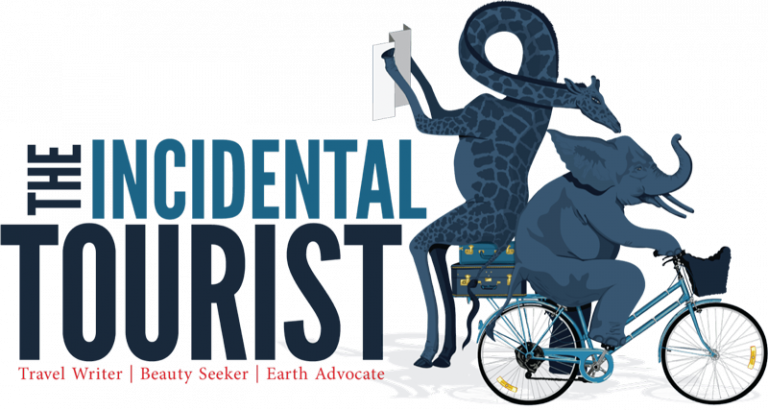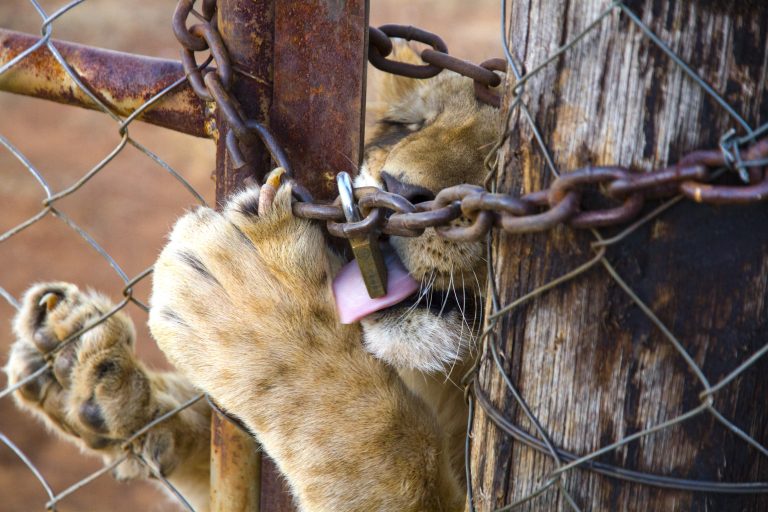
The shameful practice of South Africa’s cruel and exploitative captive-bred lion hunting industry is something that regularly makes headlines, with newly revealed insight into how rife and devastating it really is. Blood Lions the documentary first brought the travesty of this practice to the fore in 2015, but somehow despite this expose and every subsequent and ongoing effort by conservationists and action groups, the South African government has ignored the pleas to put an end to the practice. One would be forgiven for wondering whether decision-makers are somehow ‘benefitting’ from the trade. Why else would such an ‘industry’ – unmonitored, unethical and devastatingly cruel – still be around is a question I’ve been asking for years?
The newly released book by Lord Ashcroft ‘Unfair Game’ brings to light more details of what is happening right now. As below, written by Don Pinnock for Conservation Action Trust.
‘Unfair Game’ reveals the cruel reality of canned lions
Almost without exception, every single captive-bred lion in South Africa faces a miserable fate – petted and played with as a cub, then becoming the target in a canned hunt or ending up being slaughtered for the bone trade.
As Environment Minister Barbara Creecy’s questionable Advisory Committee determines future policies regarding the consumptive use of our wild animals, it’s been handed a devastating book by British philanthropist Lord Ashcroft on the ongoing cruelty of South Africa’s captive-bred lion industry. The final chapter of this book on the horrors of captive lion breeding in South Africa and published this week describes a deeply worrying interaction.
In an elaborate two-year undercover operation funded by Lord Michael Ashcroft, former Special Forces and security operatives documented in detail the names, places, cruel practices and trafficking routes of the industry. All the information was handed to Colonel Johan Jooste, who heads the SAPS wildlife unit. He interrogated Ashcroft’s team members, threatened to arrest them and handed it back.
Ashcroft’s approach to the South African High Commissioner in London, Nomatemba Tambo, did not even receive the courtesy of a reply. As to why, he says in this disturbing book, one must draw one’s own conclusions. “This strongly suggests the South African authorities are enabling this incredibly dangerous trade.”
He estimates there are now 12,000 captive lions in the country and only 3,000 wild lions and has proof that wild lions are being poached in Botswana to improve the captive breeding stock. He says it’s most probable that the legalised trade in lion parts is stimulating poaching of a shrinking population of wild lions.
It’s painful to read the cruelty he documents. Almost without exception, every single captive-bred lion in South Africa faces a miserable fate – petted and played with as a cub, then becoming the target in a canned hunt or ending up being slaughtered for the bone trade.
The team’s objective was to hand over all evidence collected to the SAPS. It was the sort of sting operation you’d like to imagine the local Green Scorpions would mount, but for some reason they never have.
Ashcroft is an Anglo-Belizean businessman, author, former deputy chairman of the British Conservative party and life peer who is no stranger to controversy surrounding his political writing and where he pays his tax. But, importantly for this operation, he abhors cruelty to animals and is immensely rich.
The South African sting operation had all the hallmarks of a James Bond movie. It involved operatives with military training, a safe house stuffed with sophisticated surveillance technology, a helicopter, drones, magnetic trackers on cars and lion bone consignments, camera traps, button cameras, throwaway “burner” phones and a cellphone which, unbeknown to its owner, was fitted with spyware that transmitted everything back to the safe house. Their cover story was that they worked for a high-end international property company.
A local spy and former policeman, codenamed Lister, was recruited to infiltrate the captive breeding outfits and was, in turn, spied on by the Ashcroft team because he was, himself, a lion bone trader. He was given a 4×4 with cameras facing both ways and recording equipment to capture every conversation. Both the 4×4 and his wife’s car were secretly digitally tracked.
The team’s objective was to hand over all evidence collected to the SAPS. It was the sort of sting operation you’d like to imagine the local Green Scorpions would mount, but for some reason they never have. You’d also imagine they’d be grateful for the help offered by a sophisticated detection unit, but it was summarily rejected.
The book names many lion breeding outfits and their owners, some fronting as wedding venues. San Souci Safaris, Akwaaba Lodge and Predator Park, Wag ’n Bietjie Farm, Lechwe Lodge, Voi Lodge, Moreson Ranch, Pienika Farm and Cheetau Lodge feature prominently, as do names like Jason Whitehead, Nazeer Cajee, Bok van Zyl and a shady probable-Vietnamese named Michael. Ashcroft estimated there to be around 300 breeding operations, all with the simple goal of making money from lions.
Lion bone exports were regularly exceeded by being sent through allegedly bribed, corrupt airport staff at OR Tambo Airport who bypassed search protocols. The team discovered that each buyer has someone on their payroll at the airport. A number of these networks are controlled by Russian nationals.
The team found abattoirs awash with blood and flies where lions were butchered and their bones soaked in salt or alcohol for shipping to Asia for fake tiger bone wine. Hundreds of tigers were being bred for this trade at over 40 sites. They were also being used to produce freakish ligers – tiger/lion crosses – because they have bigger bones.
Captured on secret camera are gruesome scenes like this: Two men drive into a fenced enclosure at Moreson Ranch where a terrified lioness has climbed into a tree. A gunshot cracks, a branch splinters and the lioness roars in pain. She falls from the tree and pulls herself behind it. The men in the vehicle shoot her again and again.
Then they move closer. The lioness lies panting in a pathetic state, bullet holes pockmarking her flank. The men change their rifles for pistols and shoot her some more – 10 shots in all – while laughing and chatting. The “spy” later comments that the marksmanship was deliberately poor, avoiding the quick kill shot because the men didn’t want to damage her skull for the lion bone trade.
In other scenes, lions are stunned with tranquiliser darts then shot through the ear with a .22-calibre rifle so as not to damage their skulls. Some are transported for long distances in small steel crates that are too small for the animals to stand up or turn round. They were told of a Russian who hunted a drugged lion with hounds. According to Lister, “the lion didn’t have a chance”.
This type of hunting is illegal.
The team found abattoirs awash with blood and flies where lions were butchered and their bones soaked in salt or alcohol for shipping to Asia for fake tiger bone wine. Hundreds of tigers were being bred for this trade at over 40 sites. They were also being used to produce freakish ligers – tiger/lion crosses – because they have bigger bones.
The team secreted one of their operatives, a black Kenyan posing as Lester’s assistant, on a wild lion hunt in Botswana. The idea was to poison the lions so their cubs could be trafficked to South Africa to improve the captive breeding stock.
This is a painful but necessary book to read. It faces terrible cruelty and doesn’t blink.
South Africa is the only country in the world that allows large-scale captive-lion breeding and has an annual quota for the legal export of lion bones. According to Ashcroft, “by allowing such a barbaric practice, the South African government is harming its reputation of a country that treasures its position on the international stage in the aftermath of apartheid.”
In his conclusion, Ashcroft is not hopeful.
“The idea that evil flourishes when good people sit by and watch but do not act is well known. Arguably, the authorities have become the enablers of all this, overseeing lion hunting regulations and awarding licences for the export of lion bones with what appears to be the lightest of touches and wilfully ignoring wrongdoing when they learn of it.
“I find it deeply distressing that those in a position of power and responsibility appear not to care about these issues at a time when they are worse than they have ever been… The fact of the matter is that over a relatively short space of time, a small number of people in South Africa have been allowed to systematically abuse lions… How much longer will South Africa allow this industry to prosper?”
He calls on the government to ban captive-bred lion farming and the governments of the world to forbid the import of captive-bred lion trophies, warning that as the pandemic recedes, South Africa will have trouble rebuilding its status as a responsible tourism destination if marred by the stigma of canned lion hunting and lion bone export.
** The article originally appeared in the Daily Maverick.

Heads out on a helicopter during his investigation into ‘captive-bred’ lion farming in South Africa. 2019.
More about the book in summary
Renowned author Lord Michael Ashcroft is once again lifting the lid on South Africa’s controversial and widely criticised captive-bred lion industry. UNFAIR GAME is the result of an extensive and harrowing undercover operation put together by Lord Ashcroft with military precision investigating the dark world of South Africa’s illegal lion trade that sees an estimated 12,000 lions in captivity in a country where there are only 3000 of these magnificent creatures left in the wild. Removed from their mothers at just a few days old, these lions enter a cycle of exploitation that sees them:
- Cuddled as cubs by unwitting tourists for “selfie” moments;
- Used for “walking with lions” experiences when they become too big to cuddle;
- Sold to canned hunting farms to be shot once they are too big to walk with and;
- Their carcasses shipped to China and the Far East to fuel the growing trade in lion bones for the traditional Chinese medicine market.
In the book, Lord Ashcroft tells of the unspeakable cruelty witnessed by his undercover team at lion farms in South Africa. UNFAIR GAME will be released in the UK on the 16 June and will be available in South Africa bookshops from 16 July 2020. Lord Ashcroft has achieved his goal of demonstrating how South Africa has become the global centre of this shameful industry in which lions are effectively being farmed and exploited from birth to death and beyond.
More about the author
Lord Ashcroft KCMG PC is an international businessman, philanthropist, author and pollster. He is a former treasurer and deputy chairman of the UK’s Conservative Party. He is also honorary chairman and a former treasurer of the International Democratic Union. He is founder and chairman of the board of trustees of Crimestoppers, vice-patron of the Intelligence Corps Museum, chairman of the trustees of Ashcroft Technology Academy, chancellor of Anglia Ruskin University, a senior fellow of the International Strategic Studies Association and a former trustee of Imperial War Museums. His books include Victoria Cross Heroes: Volumes I and II; Call Me Dave: The Unauthorised Biography of David Cameron; White Flag? An Examination of the UK’s Defence Capability and Jacob’s Ladder: The Unauthorised Biography of Jacob Rees- Mogg. See more at www.LordAshcroft.com and www.LordAshcroftWildlife.com.
Cruelty Captured on Video
Captured on film, the footage shows lions being slaughtered at close quarters. This content is graphic and not for the faint-hearted and illustrates the horror that is canned hunting and what lions go through when they are being bred for the bullet. It took me more than a week to find the strength to watch it, as I profess to do my best to speak out from an educated and experience-based position – although there are scenes I will wish I could unsee.
** If you would like to order a copy of Unfair Game, please follow either of the links below. Alternatively, it will be available in South African bookshops on the 16th July at a price of R275.00 per book. Pre-order with Biteback Publishing or pre-order with Amazon.
** For more information please contact Lesley Simpson at lesley@lscpr.co.za or call +27 82 804 011. Please note that proceeds from the sale of the books will be donated to wildlife charities in South Africa.
** Read my other posts by Conservation Action Trust.












